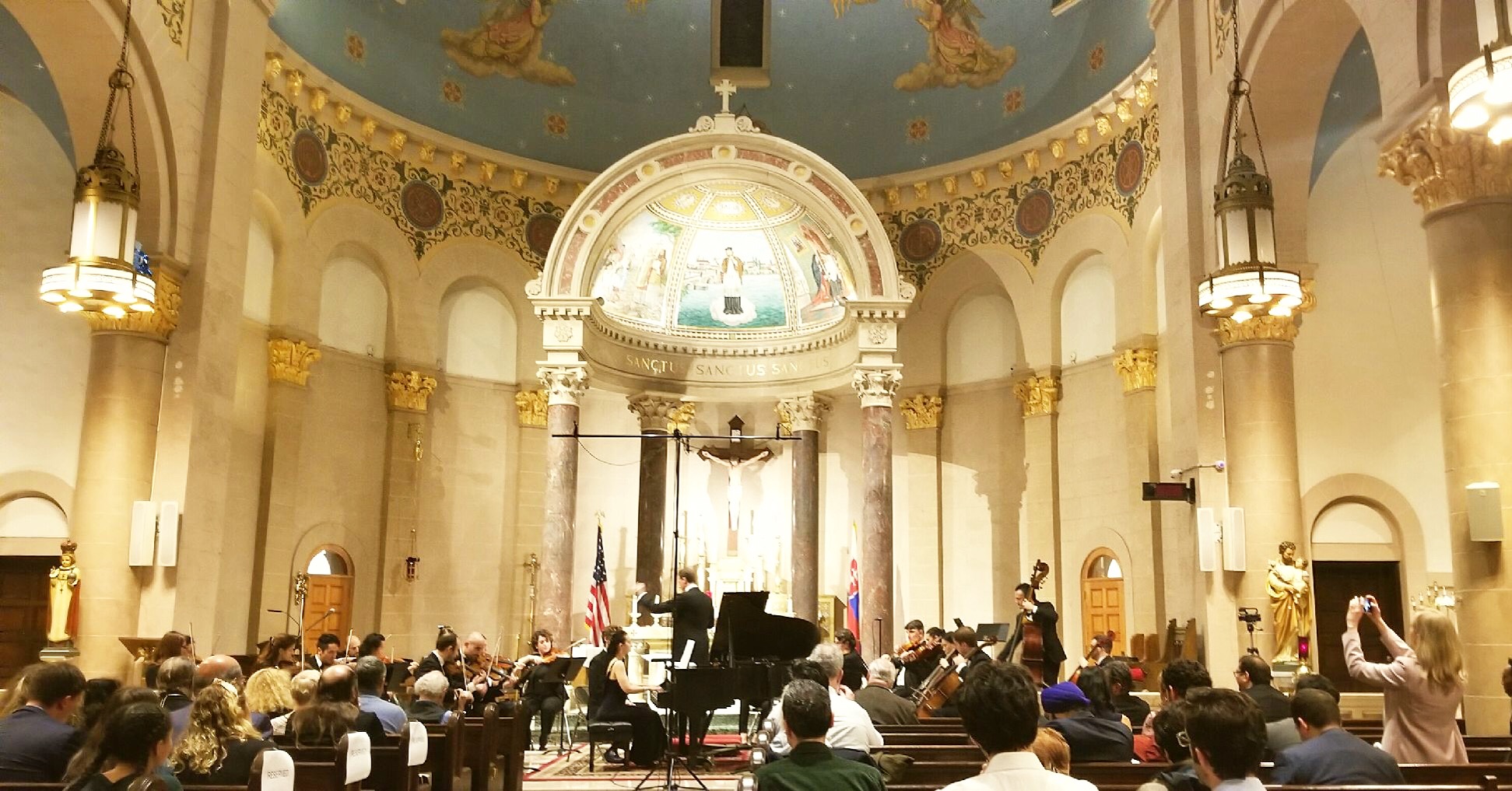
Next there followed the Variations on a Bulgarian Folk Song “Dilmano, Dilbero,” op. 2, for solo piano of the Bulgarian composer Alexander Vladigerov (1933–1993), whose father, Pancho Vladigerov (1899–1978)—a leader of the “Second Generation” composers who combined classical and folk music forms—is widely considered to be the most important composer in Bulgarian history. Bulgarian folk music is characterized by asymmetric meters of 5, 7, 9, 11, 13, or 15 beats per measure, which variously subdivide into smaller units of 3 and 2 beats. The resulting rhythmic complexity from the shifting meters and accents lends considerable variety to the music. Valdigerov’s piece, a tuneful and tonal barnstormer that is a real crowd-pleaser, consists of the theme, nine short variations of assorted tempos and characters, and a coda. Most of the sections are energetic and propulsive, with the seventh variation (the longest) providing an island of relative repose. The theme and first five variations require only a bit more than two minutes to dispatch, after which the remaining variations are longer and more elaborate. The fourth and fifth variations integrate elements from various styles of jazz; the seventh invokes the spirits of Tchaikovsky and Rachmaninoff, while the eighth and ninth suggest a touch of Gershwin. The proceedings were in the assured hands of the Bulgarian-born pianist Tania Stavreva, a New York area resident, who in 2017 issued a recording of the work on a CD (Rhythmic Movement) on her Tania Stavreva Music LLC label (available for purchase at www.taniastavreva.com/shop, cdbaby, and Gumroad.). An expressive virtuoso with superb technical prowess, she dispatched the fierce technical difficulties of the piece with seeming effortlessness, amply displaying both power and delicacy as required while always projecting a singing line and ringing tone.

Stavreva and the orchestra then combined forces in the world premiere of the Concertino Campane by Nicholas Reeves, a professor of music at Adelphi University on Long Island. This three-movement work successively portrays various aspects of bells in three locations throughout the world. The brief first movement, “Three Days in a Minute,” depicts the Prague Astronomical.


Clock, first built in 1410 and elaborated upon over succeeding centuries, which simultaneously tracks several different types of time cycles (solar, lunar, sidereal, Babylonian, Old Czech, and modern 24/7). These assorted simultaneous clock movements are portrayed by the same motivic material entering and moving at different times and rates of speed, resulting in dense and dissonant polytonal textures. Next, “Ayr” portrays the Great Uspensky bell in the Kremlin. Here, the slowly moving music assumes a shimmering, eerie, other-worldly feel reminiscent of scores for sci-fi films. The closing movement, “Call Changes,” longer than the previous two movements combined, is based on the famous cascading peal of the bells in Westminster Abbey, intermixed with thematic material from Henry Purcell’s anthem Rejoice in the Lord Alway, known as the “Bell Anthem” for its reliance on the same change-ringing sequence. Here, due to this thematic basis, the music is somewhat more tonal. The piece is difficult to absorb on a single hearing, but repeated exposure (courtesy of a recording of the concert provided to me for review purposes) clarifies its structure. In contrast to the rest of the program, here the reverberant church acoustic was less than ideal, as it caused the solo piano and various overlapping string lines to blend into one another and become difficult to distinguish. That said, having attended the final rehearsal earlier in the day, I was impressed at how Stavreva, Gorbik, and the orchestra worked to adjust their playing to obtain as much clarity as possible, a major tribute to their technical skills, as was indeed the entire performance of this challenging work.
The second half of the concert comprised a single work in a contrasting Romantic vein, Tchaikovsky’s beloved Serenade for Strings. The performance was superb; I do not think I will hear a better one in my lifetime. Vladimir Gorbik, as always, conducts with great discipline, but never a lack of feeling; his interpretation was genuinely expressive without ever falling prey to sentimental, overly Romanticized swooning or gush. Aided by the rich acoustics of the performing space, he elicited a full, warm, and rich sound from his 19 string players, while always maintaining complete clarity in all the instrumental lines as well, perfectly balanced and with fine gradations of dynamics. Tempo choices were always moderate—I would have liked the introductory section of the third movement to be a little slower and more meditative, but that is a purely subjective preference—with rubato and agogic adjustments employed sparingly but tellingly. Ideally, there would have been two contrabass violins utilized instead of just one to give the bass line even more depth, but it was amazing how much richness of sound Gorbik obtained from just one player. The ensemble played with silken tone, precise execution, and heartfelt dedication, and received a much deserved hearty sound of applause at the close.


James A. Altena is the Associate Editor of Fanfare magazine, the world’s leading publication for reviews of classical music recordings. Since 2010 he has published over 1,100 reviews, including sets of the complete works of Bach and Verdi, and also contributed entries to an online discography of the complete recordings of conductor Bruno Walter.
For classical concert enthusiasts there are a couple specific dates in the future where you can catch Stravreva perform in NYC.
The first is a performance she is giving for her birthday on December 3rd, 2019 at 8pm (doors open at 7:30pm). It will be at Marc A. Scorca Hall in National Opera America Center (330 Seventh Avenue, 7th Floor), NYC. Tickets for this performance are available here: https://taniasbirthday.bpt.me/ free food and drinks will follow at the concluding reception.


